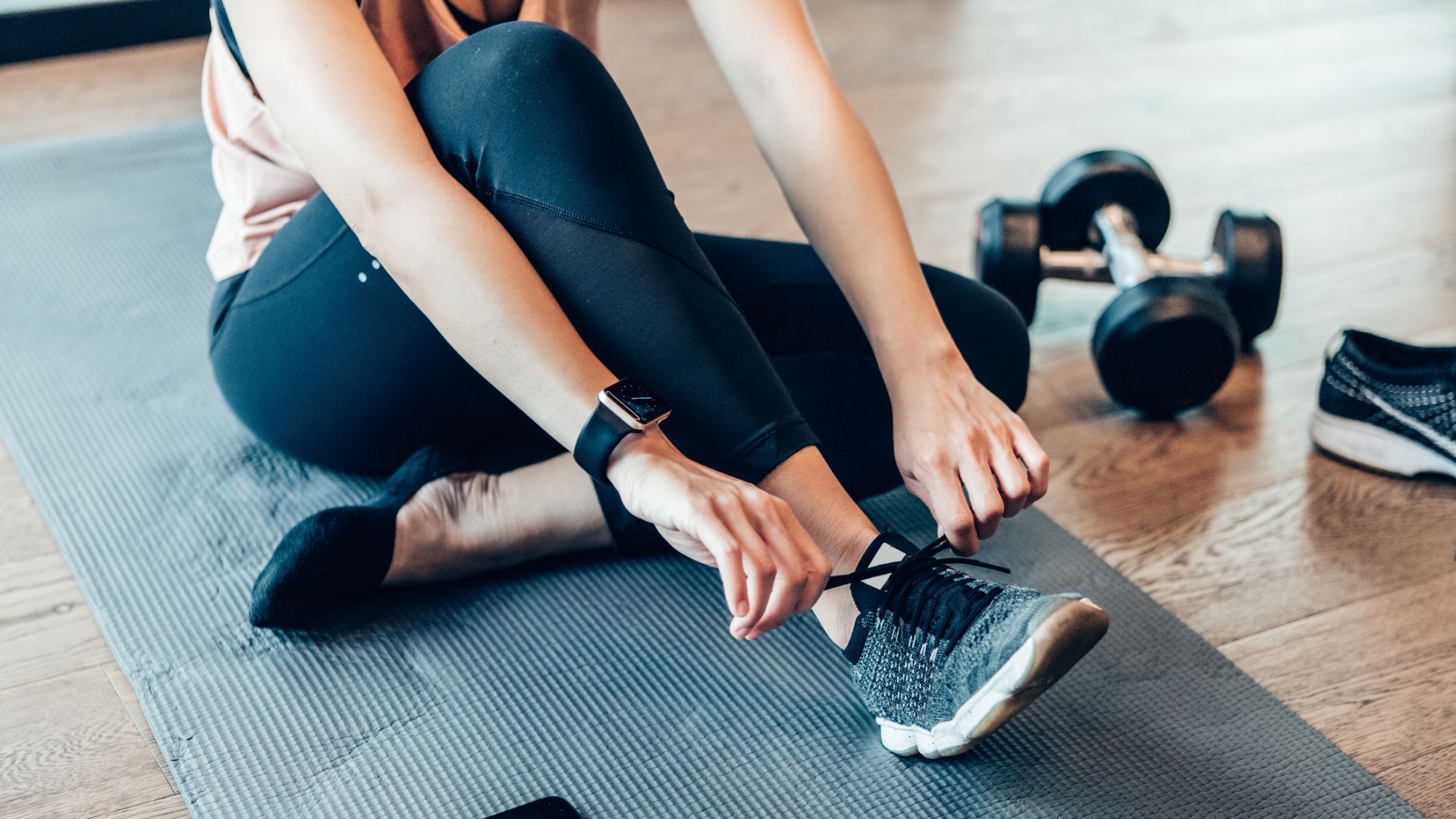Stop dieting if you want to lose weight in menopause - here's why
Dieting doesn't work for weight loss in menopause. Here, doctors and specialists explain why - and what to do instead to lose weight healthily


If you're finding weight loss in menopause to be a challenge, you're not alone. In fact, because of the way hormone levels impact our body and how they change in menopause, it's become a lot harder than it used to be.
Traditionally when we want to lose weight, we're advised to follow a diet and reduce our calorie intake - whether we want to lose a stone in a month or aim for more sustainable weight loss. This may have worked in the past but in menopause, traditional dieting may not help you lose weight. It can actually have the opposite effect and cause you to hold onto it.
No one should feel pressure to lose weight in menopause - or at any other time in life. Everyone's body is different and while you may have gained weight, that doesn't necessarily mean you have to lose it. It's ultimately down to you and what feels good for your body. If you are looking for the best methods for weight loss in menopause, whatever the reason, we have you covered with expert advice on how to get there healthily and sustainably.
Why dieting for weight loss in menopause doesn't work
While a calorie deficit is always needed to lose weight, no matter your life stage, how you get there may need to change in menopause. Traditional dieting (i.e. restricting calories and limiting certain foods), isn't the way forward. Weight loss in menopause is all about maintaining and improving your metabolism.
Metabolism is the process that turns the calories in food and drinks into energy for the body to use. Several hormones control how well our metabolism functions, including oestrogen. "During menopause, hormonal changes occur in the body that trigger metabolic changes," explains Josie Winfield, a personal trainer and nutrition coach specialising in women's health. "Menopause sees a decrease in the production of oestrogen, a steroid hormone, and this can cause the metabolism to slow down." This means the body isn't burning as many calories as it used to throughout the day just fulfilling vital needs like moving, sleeping and breathing.
However, traditional dieting can also negatively impact the metabolism. Diets that encourage a low-calorie intake can trigger the body to conserve energy and hold onto carbohydrate and fat stores, causing the metabolism to slow down.
"Calorie counting often leads to cutting out entire food groups. This is not advised when experiencing menopause. It's vital individuals consume a nutritious diet and listen to their body," notes Winfield, who works with Create PT.
Sign up for the woman&home newsletter
Sign up to our free daily email for the latest royal and entertainment news, interesting opinion, expert advice on styling and beauty trends, and no-nonsense guides to the health and wellness questions you want answered.
Together, menopause and low-calorie diets are a double whammy that can make weight loss in this stage of life difficult - and very uncomfortable, given the links between menopause and insomnia, mental health issues like increased anxiety in menopause, and lower energy levels as a result. Simply put, the body needs different things now.
So, with that in mind, what's the best approach to weight loss in menopause? Here, woman&home asks the experts for their best advice.

Josie Winfield is a personal trainer and nutrition coach specialising in women's health and wellbeing. She also works with learning platform Create PT.
What's the best weight loss diet for menopause?
To counter these changes, maintain a healthy and balanced diet. "This includes incorporating plenty of fruits, vegetables, whole grains, and lean proteins while limiting processed foods, sugars, and unhealthy fats," says Dr Chandni Rajani, a GP and women's health specialist. This makes the Mediterranean Diet or DASH the best weight loss diet for menopause, given that it's essential to prioritise nutrients like protein, complex carbohydrates, and fibre, and limit processed foods and alcohol.
Both diets work by prioritising fresh and flavour-rich foods packed with vital nutrients that are naturally lower in calories, without cutting out any particular food groups or focusing solely on calorie consumption. It's two ways to lose weight without dieting.
These diets can also help to reduce stubborn fat around the middle, per research by University Federico II in Naples, which is a particular problem in menopause. "The weight we gain during menopause doesn't distribute across our body in the same way it did before," says Dr Charlotte Norton, a weight loss specialist and the chief medical officer at The Slimming Clinic. "Pre-menopause, your weight would be more or less evenly distributed across the whole body. When we enter menopause, our weight tends to gather around the middle and, crucially, around our vital organs, which can be dangerous."
Those looking for healthy weight loss in menopause may also find it useful to make their portion sizes smaller, Dr Norton says. "Our bodies require less energy [in menopause], but we don’t tend to reduce our food intake." Reducing how much you have on your plate will naturally mean you eat less food, lowering your overall calorie intake for the day.

Dr Chandni Rajani is a GP with a special interest in women’s health. She has a wealth of experience in menstrual cycle disorders (e.g. irregular periods, period pain, heavy periods), reproductive health and contraception, menopause and fertility.
GMC Registered Dr Charlotte Norton has been working in health and wellness for almost 10 years, after graduating from Kings College Medical School. She is proud to be able to use science-backed programs to offer personalised weight-management solutions to patients at The Slimming Clinic as Chief Medical Officer.
How exercise helps with weight loss in menopause
Regular physical activity can help boost your metabolism and burn calories - both are essential for weight loss in menopause. "Incorporating aerobic exercises, such as walking or swimming workouts, and strength training can help boost metabolism and maintain muscle mass, which tends to decrease with age," says Dr Rajani.
Exercise helps the body to grow muscle, provided you also eat enough protein to lose weight. The more muscle you have, the faster your metabolism. The faster your metabolism, the more calories you'll burn resting. The more calories you burn at rest, the more likely you'll lose weight.
Low-impact aerobic workouts may also be beneficial for those who want to exercise but are struggling with some of the more negative menopause symptoms. "Once we have hit the menopause, there is an inclination to move less as our joints and muscles become more prone to aches and fatigue," says Dr Norton. Swimming, cycling workouts, yoga, and full-body Pilates are all great low-impact options with limited pressure on the bones and joints.
However, having an exercise you enjoy and that works for you and your body is most important - everyone is different. While some women find that higher-impact activities like running become more uncomfortable, this isn't the case for everyone. If you enjoy running, workout classes, and other high-impact activities, that's fine too. Keeping up a good routine that works for you will help you reap the benefits of weight loss and so much more, from improved sleep to better mental health and more chances for social interaction.

A combination of aerobic and strength training exercise is essential in menopause, the experts say.
Tips for weight loss in menopause
It's not all about diet and exercise when it comes to weight loss in menopause, however. It's important to look at changing your lifestyle habits more generally, given that one of the signs of high cortisol levels - i.e. stress - is weight gain and that some perimenopause symptoms make weight loss harder in ways you wouldn't expect.
- Move more: If you're new to exercise or find working out uncomfortable right now, you may be better off simply moving more throughout the day. We burn most of our daily calories through non-exercise activity thermogenesis (NEAT) - physical movement outside of exercise, such as walking the dog, gardening, and going up and down the stairs. Doing more of this can also help you burn calories without exercise.
- Manage stress levels: "Managing stress levels through activities like yoga, meditation, or deep breathing exercises can be beneficial, as stress can contribute to weight gain and make it harder to lose weight," says Dr Rajani.
- Learn how to sleep better: Insomnia is unfortunately a common experience in menopause, thanks to symptoms like night sweats. However, poor sleep can impact how hormones like ghrelin and leptin (which control how hungry and full we feel) behave the following day.
- Drink lots of water: It's also normal to retain more water in menopause, notes Winfield. "The body produces excess fluid because of fluctuating hormones, which can cause water retention and bloating," she says, so be sure to drink plenty of water - around two litres a day is recommended by the NHS.
- Listen to your body: Once you have a goal, like losing weight, it can be hard to see the wood through the trees. But it's important to slow down at times, take a break if you need one, and listen to your body - especially if you've made big lifestyle changes to try and lose weight. "We often work and move in autopilot mode, which means we forget or even ignore what our body tells us. If you need to rest, then rest," says Winfield.

Grace Walsh is woman&home's Health Channel Editor, working across the areas of fitness, nutrition, sleep, mental health, relationships, and sex. She is also a qualified fitness instructor. In 2025, she will be taking on her third marathon in Brighton, completing her first ultra marathon, and qualifying as a certified personal trainer and nutrition coach.
A digital journalist with over seven years experience as a writer and editor for UK publications, Grace has covered (almost) everything in the world of health and wellbeing with bylines in Cosmopolitan, Red, The i Paper, GoodtoKnow, and more.
-
 Dr Amir Khan reveals the 5 symptoms you should 'never' ignore, no matter how 'vague' they are
Dr Amir Khan reveals the 5 symptoms you should 'never' ignore, no matter how 'vague' they areDr Amir Khan, a GP who often appears on ITV's Lorraine, took to Instagram this week to share the symptoms he'll always take a second look at
By Grace Walsh
-
 Head to Hobbs for holiday-ready linen and the most elegant summer dresses you’ll find on the high street
Head to Hobbs for holiday-ready linen and the most elegant summer dresses you’ll find on the high streetWondering where to shop for a chic summer wardrobe? Hobbs has you covered
By Caroline Parr